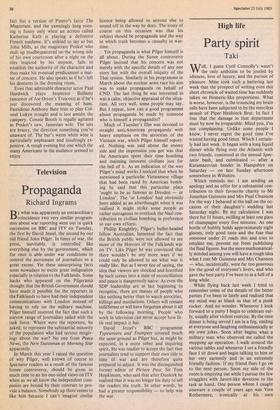Television
Propaganda
Richard Ingrams
By what was apparently an extraordinary coincidence two very similar program- mes about war reporting went out in quick succession on BBC and ITV on Tuesday, the first by David Jesse!, the second by our old friend John Pilger. In times of war, the press, inevitably, is controlled like everything else by the government, which for once is able under war conditions to control the movement of journalists to a great extent. Yet these unsurprising facts seem nowadays to excite great indignation especially in relation to the Falklands. Some hacks who appeared on the Pilgerama thought that the British Government should have made it possible for the reporters in the Falklands to have had their independent communications with London instead of having to rely on the military machine. Pilger himself resented the fact that such a narrow range of journalists sailed with the task force. Where were the reporters, he asked, to represent the substantial minority of the population who had serious misgiv- ings about the war? No one from Peace News, the New Statesman or Morning Star apparently.
In March this year I raised the question of why Pilger, well known of course to Spectator readers as a result of the famous Sunee controversy, should be given so much time to air his one-sided views on ITV when as we all know the independent com- panies are bound by their contract to pro- vide a balance. Somebody up there seems to like him because I can't imagine similar licence being allowed to anyone else to sound off in the way he does. The irony of course on this occasion was that his subject should be propaganda and the way in which truth becomes a casualty in war- time.
Yet propaganda is what Pilger himself is all about. During the Sunee controversy Pilger insisted that his concern was not merely with the specific details of any one story but with the overall iniquity of the Thai system. Similarly in his programme in March about the nuclear arms race his aim was to make propaganda on behalf of CND. The last thing he was interested in was a calm, objective appraisal of the situa- tion. All very well, some people may say. But I repeat, how can a good programme about propaganda be made by someone who is himself a propagandist?
Much of Tuesday's film was devoted to straight anti,American propaganda with heavy emphasis on the atrocities of the Vietnam war, which Pilger himself report- ed. Nothing was said about the enemy side and the impression you got was that the Americans spent their time bombing and maiming innocent civilians just for the hell of it. As an indication of the way Pi!gees mind works I noticed that when he mentioned a particular Vietnamese village that had been razed by American bomb- ing he said that this particular place 'ought to be as famous as Dresden — or London'. The 'or London' had obviously been added as an afterthought when it was realised it might strike some people as rather outrageous to overlook the Nazi con- tribution to civilian bombing in preference to our own efforts.
Phillip Knightley, Pilger's bullet-headed fellow Australian, lamented the fact that the British public were not allowed to see more of the Horrors of the Falklands war on TV. Like Pilger he was convinced that there wouldn't be any more wars if we could only be allowed to see what war is really like. But as I never tire of saying, the idea that viewers are shocked and horrified by such scenes into a state of reconciliation and peace is dangerously naive. As even the SDP leadership are at last beginning to recognise, there are masses of people who like nothing better than to watch atrocities, killings and mutilations. Others will remain indifferent or will have forgotten about it all by the following morning. People who work in television can never accept how lit- tle real impact it has.
David Jessel's BBC programme Typewriters and Trumpets covered much the same ground as Pilger but, as might be expected, in a more sober and inquiring spirit. He was readier to accept the fact that journalists tend to support their own side in time of war and are therefore quite prepared to adjust. It was the distinguished former editor of Picture Post, Sir Tom Hopkinson, who said that after Dunkirk he realised that it was no longer his duty to tell the readers the truth. In other words, he had a greater responsibility — to help win the war.






































 Previous page
Previous page